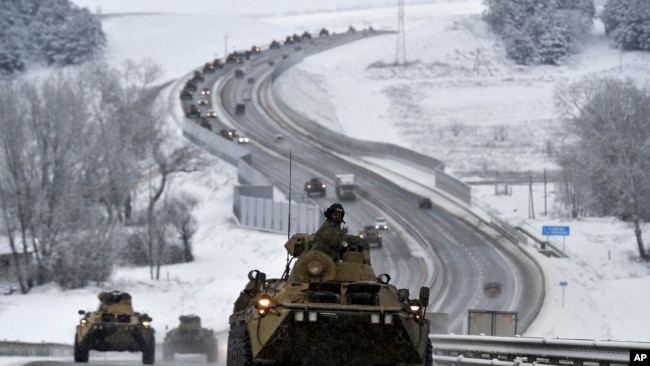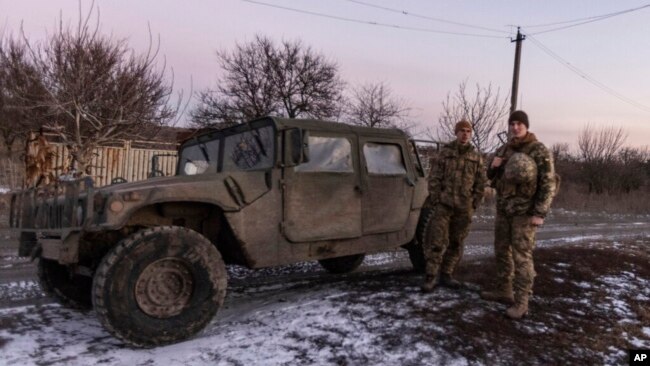ウクライナ:今、危険な状態へ
耳を疑いました。聞き間違ったのかと?
クリミアと同じ轍を踏むことになります。
類は友を呼ぶ。戦略的友でしょうが、同じ匂いがします。
VOAで英語を学び、世界の今を見つめましょう!!
ウクライナに対して米国は何ができるのか?(和訳)
Can the US Do to Help Ukraine?
Jan.24,2022
米国大統領ジョー・バイデンは、ロシア兵がウクライナに侵攻した場合、軍隊を派遣しないと発言しました。
米国にはウクライナを支援する責任はありません。しかし、旧ソビエト連邦の国を助けるために何もしないのは、リスクもあります。専門家によれば、もし米国が反撃しなければ、東欧の安定を損なう可能性があるといいます。ロシアはエストニア、ラトビア、リトアニアといった他の国に対する動きを検討する可能性が出てきています。しかし、これらの国々は北大西洋条約機構(NATO)の支持を受けています。
アントニー・ブリンケン米国務長官は今週、ウクライナ政府関係者やNATOの同盟国との会談のためヨーロッパを訪れています。また、ロシアの外務大臣とも会談する予定です。
ブリンケン氏は、米国はウクライナの独立と自国の領土を守る権利を支持すると述べています。ロシアの侵攻に米国がどう対応するかは説明していません。
なぜウクライナの戦いを助けないのか?
ジョー・バイデン大統領は今週初め、プーチン氏がウクライナに戦闘機を送り込むと”推測している”が、全面戦争にはならないかもしれない、と述べています。過去にバイデン氏は、ロシアと戦うために米軍をウクライナに派遣することはないだろうと述べてもいました。しかし木曜日、彼はロシアがウクライナと戦争を始めた場合、”重い代償を払うことになる”と、彼はさらに述べています。
ロシアはこれに対し、侵攻を計画しているわけではないと言っています。米国や他の国々が武器や物資を送り込み、ロシアを”挑発”しているのだと非難しました。
ロシアは、NATOがさらに東に拡大することを望まないと言っています。米国はその要求を拒否しています。クリミア半島では、すでにロシアとウクライナの間で戦闘が起きています。8年間の戦闘で1万4,000人以上が死亡しています。
What Can the US Do to Help Ukraine?
United States President Joe Biden says he will not send troops to Ukraine if Russian soldiers invade.
The U.S. has no responsibility to support Ukraine. But doing little to help the former Soviet Union nation has risks, too. Experts say that if the U.S. does not push back, it could hurt the stability of eastern Europe. Russia could consider moves against other countries like Estonia, Latvia and Lithuania. Those nations, however, have the support of the North Atlantic Treaty Organization, or NATO.
U.S. Secretary of State Antony Blinken is in Europe this week for meetings with Ukrainian officials and NATO allies. He also plans to meet with Russia’s foreign minister.
Blinken has said the U.S. supports Ukraine’s independence and right to defend its territory. He has not explained how the U.S. would respond to a Russian invasion.
Why not help Ukraine fight?
President Joe Biden said earlier this week that he “guessed” Putin will send fighters into Ukraine, but it might not be a full war. In the past, Biden said he would not send the U.S. military into Ukraine to help fight Russia. On Thursday, however, he added Russia will “pay a heavy price” if it starts a war with Ukraine.
Russia responded by saying it is not planning an invasion. It accused the U.S. and other nations of “provoking” Russia by sending weapons and supplies to the area.
Russia has said it does not want NATO to expand further east. The U.S. has rejected that demand. There is already fighting between Russia and Ukraine on the Crimean Peninsula. More than 14,000 people have died over eight years of fighting.
In Washington, both Republicans and Democrats are urging Biden and Blinken to do more. Congressman Jim Hines of Connecticut, a Democrat, said the U.S. should be sending more supplies and military trainers into Ukraine to help.
Philip Breedlove is a former general in the U.S. Air Force and was the top NATO military leader in Europe from 2013 to 2016. He said if Putin invades Ukraine and no one fights back, “we will see more of the same.”
What can Biden do to stop Russia?
It would be difficult to stop a Russian invasion, but experts say the U.S. could make strategic threats to make Putin hold back.
Seth Jones is a political scientist, and Philip Wasielewski is a former CIA officer. They wrote about Ukraine on January 13 for the Center for Strategic and International Studies. They said the best defense would be preventing a quick Russian victory. If Russia believed that a war with Ukraine could take a long time and have economic, political and military costs, it could think twice about an invasion.
Biden’s advisers say they are thinking in a similar way.
How is the U.S. supporting Ukraine’s military now?
John Kirby is the press spokesperson for the Pentagon. He said there are about 200 members of the U.S. National Guard in Ukraine training soldiers along with other special U.S. troops. He said the U.S. does not plan to send more people.
The U.S. recently said it will send another $200 million in military aid to Ukraine. That is in addition to about $2.5 billion of military aid sent since 2014.
What would the U.S. do to help after a Russian attack?
National security adviser Jake Sullivan said the U.S. would increase support for Ukraine, but did not say exactly how.
The U.S. also said it might increase military support to NATO member nations in eastern Europe.
Jones and Wasielewski wrote that the U.S. should make it clear it will fully support Ukraine financially if Russia invades. They said the aid could be delivered by U.S troops or by the CIA. However, these actions would put Americans in the middle of a war the U.S. is trying to avoid.
Words in This Story
stability – n. the quality or state of something that is not easily changed or likely to change
provoke – v. to cause the occurrence of (a feeling or action) or to make (something) happen
strategic – adj. of or relating to a general plan that is created to achieve a goal in war, politics, etc., usually over a long period of time

